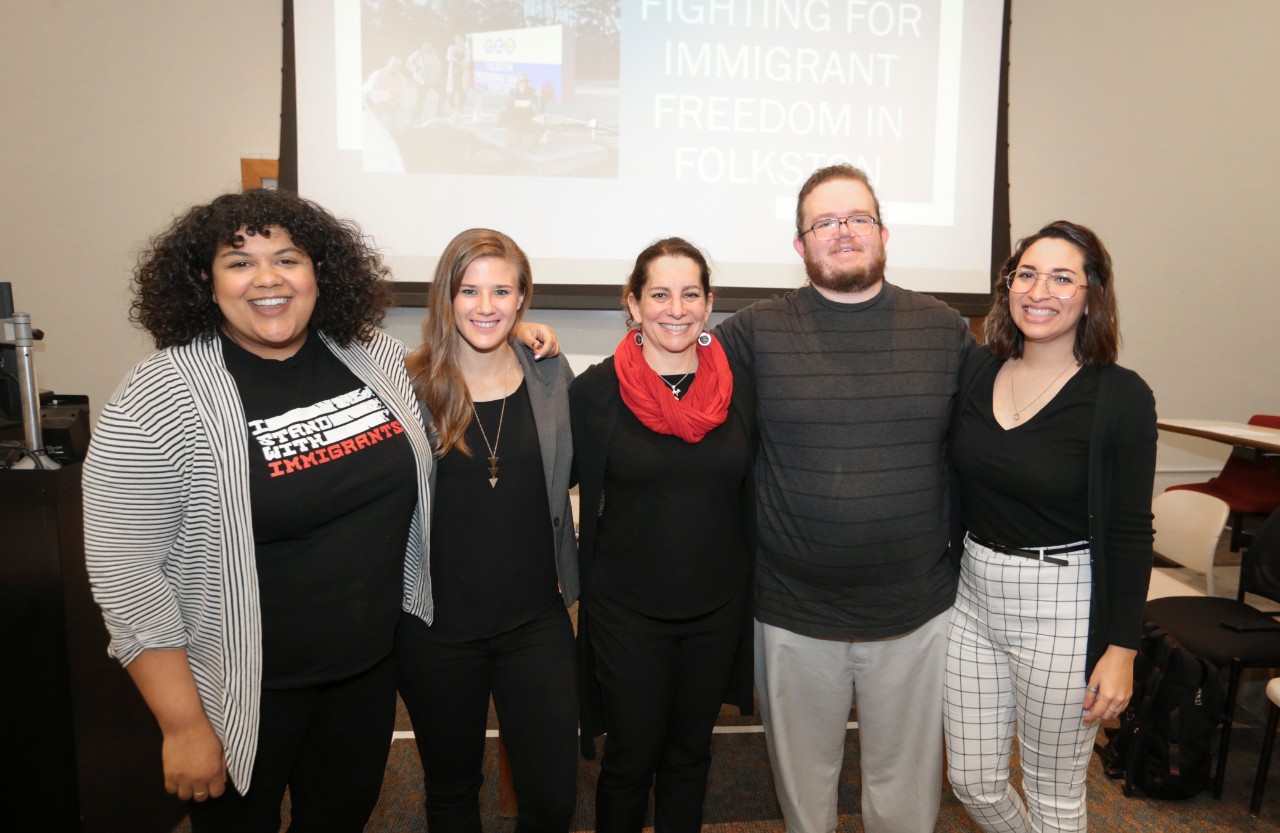
UC Law students volunteer at Georgia immigrant detention center
A group of Cincinnati Law students didn’t know what to expect when they traveled to a rural Georgia town to learn about immigration detention centers firsthand. What they saw was eye-opening.
During winter break, four University of Cincinnati College of Law students took a trip to Folkston, Georgia, to volunteer at an immigration detention center. Cincinnati Law students Brittany Triggs (3L), Natalia Trotter (3L), Isabelle Johnston (2L) and Kevin Kennedy (3L) didn’t know what to expect when they began the 11-plus-hour drive to Georgia, but by the end of the week-long trip, they knew their perspectives on immigration would never be the same.
With funding from donor and UC alum Ann deGroot, who has a deep interest in immigration rights, Triggs worked with Nancy Ent, program manager with the law school’s well-known Urban Morgan Institute for Human Rights, to organize everything from hotels to transportation for the trip. DeGroot’s late husband Ido was a Holocaust survivor, a fact that fueled Anne’s interest in making the trip possible. “Social justice was important to Ido,” she says, “and this fund was created in his honor so that Cincinnati Law students can help fight for social justice.”
The group was accompanied by a supervising attorney and Executive Director of the Immigrant and Refugee Law Center in Cincinnati, Julie LeMaster. LeMaster and the students joined forces with the Southeast Immigrant Freedom Initiative (SIFI), a branch of the Southern Poverty Law Center in Georgia that provides pro bono legal representation in several southeastern immigration detention centers.
I wanted to see them for myself. You develop a deeper layer of understanding about the whole system through this kind of experience.
Brittany Triggs (3L)
Triggs’ idea for the trip was sparked by her curiosity to see a detention center firsthand. Before coming to Cincinnati Law she was doing legal aid work, and then decided to come to Cincinnati Law with the goal of becoming an immigration attorney. Although you can learn about the detention centers and immigration policies in textbooks and newspaper article, Triggs says, “I wanted to see them for myself. You develop a deeper layer of understanding about the whole system through this kind of experience.”
Conditions of the Facility
In their post-trip presentation to the student body, the volunteers explained how going to the center was like visiting someone in prison. On the outside, the center was lined with barbed wire and cement walls, and the inside, they said, engrained the idea of prison for the detainees. Inside the center families are separated, privacy is lost and the individuals are treated “like cattle and given numbers instead of names,” Kennedy explained.
Everything about the facility was meant to dehumanize the individuals, the students explained. Detainees were color-coded by uniforms and stripped of their individuality.
Interestingly, near the Folkston center where the students volunteered was one of the detention centers that the Atlanta-based rapper 21 Savage was detained after his ICE arrest earlier this year.
Lack of Legal Resources
When the students entered the facility, they were swarmed by people — most of whom do not speak English — begging for legal aid. The students later learned that more often than not, detainee’s documentation and identification paperwork is taken from them by ICE and never returned.
One of the most shocking discoveries for the students was the lack of legal resources for the center’s detainees. Most court hearings occur via video conference. The students explained that they never saw a judge in the facility, and sentencing happened almost immediately.

Kevin Kennedy (3L), Brittany Triggs (3L), Isabelle Johnston (2L), and Natalie Trotter (3L).
Since the 1990s, there has been an increase of immigration detainees in the U.S., as well as the privatization of these facilities. The students explained how this rise in privatized detention centers has contributed to the decline in legal representation at the centers. According to the SIFI, “When [detainees] do have an attorney, they’re 10 times more likely to win their case.”
A Client Freed
In the middle of their time in Georgia, the students were able to witness a powerful moment for one detainee. Juan Carlos had been in the Folkston detention center for 11 months seeking asylum from his home country of Honduras. After a trying and difficult time in the center, Carlos was released, and the students greeted him outside of the center’s gates. Triggs said that witnessing this release “made it all worth it.”
Three of the four students from the trip plan to continue working in immigration law post-graduation. For them, actually being at the center, seeing these “jails,” and talking to the detainees was transformative. Above all, the experience solidified their passion to become lawyers.
Related Stories
Hoxworth employees help pen latest edition of textbook widely...
July 8, 2025
Hoxworth Blood Center, University of Cincinnati, is proud to share that four apheresis employees are now published authors. Caroline Alquist, MD, Krystol Weidner, Kelly Anstead and Jamie Swafford helped write Principles of Apheresis Technology, Eighth Edition.
Veterans urge mindfulness with fireworks
July 8, 2025
Spectrum News 1 and WCPO coverage of UC Veterans Programs & Services in conjunction with Independence Day. Interviews with UC's program director Terence Harrison and veteran-student Crystal Merino.
What might be going on if rest makes your back pain worse
July 8, 2025
The University of Cincinnati Gardner Neuroscience Institute's Joseph Cheng was featured in a SELF article discussing situations and strategies when rest appears to be making back pain worse.
